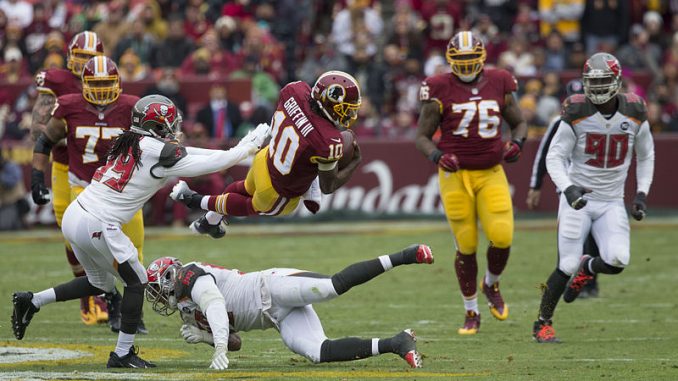
Two Sundays ago Super Bowl winning quarterback Joe Flacco, sidelined with a bad hip, was replaced by 2016 Heisman winner Lamar Jackson. In his two starts for the Baltimore Ravens, the former Louisville Cardinal racked up 328 passing yards, 190 rushing yards, a rushing and passing touchdown and three interceptions.
In recent years, top college teams have been producing many run first quarterbacks who put up great numbers in school, but run around like headless chickens in the NFL.
From Robert Griffin III, who had one good season before succumbing to injury, to Terrell Pryor, who just couldn’t throw the ball, many of these young athletes are entering an unforgiving league with the wrong toolkit for long-term success.
Eight teams in the NFL have had the same starting quarterback for 10 or more seasons: Tom Brady with the Patriots, Eli Manning with the Giants, Phillip Rivers with the Chargers, Ben Roethlisberger with the Steelers, Drew Brees with the Saints, Aaron Rodgers with the Packers, Matt Ryan with the Falcons and Joe Flacco with the Ravens. All of these quarterbacks have one thing in common: they are pure pocket passers.
Over the past 10 years, these eight quarterbacks have started more playoff games than the rest of the NFL combined. They also happen to be the winners of seven of the last 10 Super Bowls.
Running quarterbacks simply do not cut it in the NFL. Injuries caused by their mobility and/or incompetence at the position result in little success.
For example, in his three years as a starter in Washington, Robert Griffin III never played a full season. He started 15, 13 and nine games in 2012, 2013 and 2014, respectively, before being traded. Geno Smith started for the Jets for two years amassing 34 interceptions and just 25 touchdowns before being signed by the Giants as a backup.
One exception may be Seahawks star quarterback Russell Wilson. Although the majority of fans would categorize him as a runner, Wilson has only attempted 41 rushes for 231 yards 11 games into the 2018 campaign. He has tallied 25 touchdowns and only five interceptions. On the other hand, Jackson has already rushed for 329 yards on 65 attempts and he has only started two games with Baltimore.
There is a clear division between running and traditional quarterbacks in the NFL based on style and athletic ability. While some coaches and general managers are drawn to the “eye candy” that is spinning and juking quarterbacks, they fail to consider that mobility is more of a curse than a blessing when attacking NFL caliber defenses. These quarterbacks will get hurt trying to run for extra yards or attempting to imitate a tailback’s skill level.
Quarterbacks like Tom Brady, Peyton Manning and Drew Brees have never put up rushing numbers like the Lamar Jacksons of the world. They do, however, prove that athletic ability at the quarterback position is secondary to the intangibles, something yet to be demonstrated by any rushing quarterback.
For these runners to have a chance at success in the NFL moving forward, one of three things need to happen. One, coaches need to stop encouraging their prized quarterbacks to run, two, these quarterbacks need to adapt their play style to that of the NFL, or three, these players need to be smarter about when to utilize their legs and when to take a sack or throw it away.
Considering the history of the NFL and running quarterback’s lack of success, I’m pretty skeptical about the transition to this style of quarterback. One thing I am confident in is that Lamar Jackson will not be the one to break this trend. However the NFL never fails to surprise.
